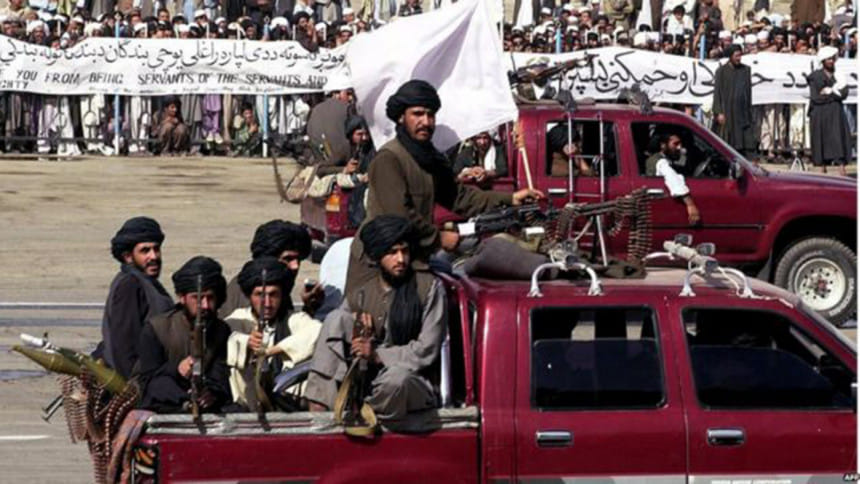Taliban admit Mullah Omar death silence

The Afghan Taliban have confirmed covering up their former leader Mullah Omar's death for more than two years.
A biography of his successor Mullah Akhtar Mansour published on Monday says Mullah Omar died on 23 April 2013.
The news was kept secret by a handful of Taliban leaders on tactical grounds.
Official statements continued to be released in the name of Mullah Omar until July when Afghan intelligence announced he had died in a hospital in Pakistan.
The movement confirmed on 30 July that its long-time leader was dead, but did not say when, where or how - only that it had been from an illness and had remained in Afghanistan since the US-led invasion in 2001.
In his successor's biography the group made clear why news of his death had been suppressed.
"Several key members of the supreme leading council of the Islamic Emirate [Taliban] and authentic religious scholars together decided on concealing the tragic news of the passing away of [Mullah Omar]... and keep this secret limited to the very few colleagues who were already informed of this incorrigible loss," the biography said.
"One of the main reasons behind this decision was... that 2013 was considered the final year of power testing between the mujahideen and foreign invaders who... had announced that at the end of 2014, all military operations by foreign troops would be concluded."
Mullah Omar: Statements and references 'from beyond the grave'
August 2013: In a speech marking the Muslim festival of Eid, Mullah Omar said the Taliban would try to reach an understanding with the Afghan people for "an inclusive government based on Islamic principles" when foreign forces pull out.
October 2014: Pakistan Taliban spokesman Shahidullah Shahid and five other senior figures were expelled because they had doubts about the leadership of Mullah Omar.
April 2015: Taliban publish surprise biography of Mullah Omar to mark his 19th year as their supreme leader. It says Mullah Omar "remains in touch" with day-to-day Afghan and world events.
July 2015: Mullah Omar backs peace talks with the Afghan government, saying negotiations are a "legitimate" way of achieving the objective of ending occupation by foreign forces.
Nato troops ended their combat mission at the end of last year, although a smaller US-led force remains in the country.
Mullah Mansour, Omar's deputy, was appointed leader the day after his death was announced. Observers predicted the move would divide the militants, with many senior figures opposed to him.
According to Afghan intelligence, Mullah Omar died of health problems at a hospital in Karachi. Pakistan has always denied that he was in the country.
The cause of his death is still unclear and Mullah Mansour's biography sheds no new light.
The 5,000-word book, in five languages, says the new leader was born in 1968 and praises him as a tireless holy warrior and good listener, Associated Press news agency reports.
It is being seen as an attempt by his supporters to bolster his position amid continuing disputes over his leadership.
Mullah Omar founded the Taliban during Afghanistan's civil war in the early 1990s.
His alliance with al-Qaeda leader Osama Bin Laden prompted the US-led invasion of Afghanistan in 2001.

 For all latest news, follow The Daily Star's Google News channel.
For all latest news, follow The Daily Star's Google News channel. 



Comments